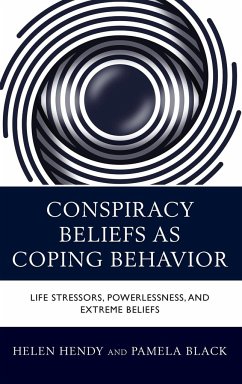This book provides new answers to who and psychologically why individuals sometimes adopt conspiracy beliefs and thoughts of violence. Five conspiracy beliefs are considered: Government Malfeasance, Malevolent World Power, Extra-terrestrial Cover-up, Personal Well-being Threat, and Control of Information. Using a survey of 977 US citizens, the book compares thirteen possible demographic characteristics (who?) to see which ones are most associated with extreme beliefs. The book then evaluates a three-step psychological sequence (why?) in which individuals experiencing intense life stressors (health, money, or loneliness), combined with powerlessness (displayed as PTSD symptoms), have increased risk for extreme beliefs, perhaps because they offer a sense of understanding, strength, and community.
Hinweis: Dieser Artikel kann nur an eine deutsche Lieferadresse ausgeliefert werden.
Hinweis: Dieser Artikel kann nur an eine deutsche Lieferadresse ausgeliefert werden.








